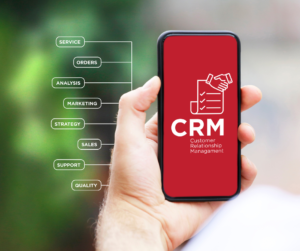Wondering how to choose the best CRM for your businesss?
A Customer Relationship Management (CRM) system is an invaluable tool for achieving this goal. A well-chosen CRM streamlines communication, improves lead management, and empowers your team to deliver exceptional customer service. But with a plenty of CRM options available, selecting the right one for your business can feel overwhelming.
This comprehensive guide will equip you with the knowledge and steps necessary to navigate the CRM selection process effectively. We’ll delve into key considerations, explore essential features, and showcase some of the top CRM solutions in 2024.

Why Do You Need a CRM in 2024?
The benefits of implementing a CRM system are undeniable:
- Enhanced Customer Relationships: A CRM centralizes customer data, giving your team a 360-degree view of interactions, preferences, and purchase history. This fosters personalized communication and strengthens customer loyalty.
- Improved Sales Efficiency: Managing leads, tracking opportunities, and automating workflows become effortless with a CRM. Your sales team can focus on closing deals instead of tedious administrative tasks.
- Boost in Productivity: CRMs eliminate data silos and streamline collaboration. Information is readily accessible, minimizing redundant tasks and maximizing team output.
- Data-Driven Decision Making: CRMs generate valuable reports and insights that empower better decision-making across departments. You can identify customer trends, target marketing campaigns more effectively, and optimize sales strategies.
- Scalability for Growth: As your business scales, your CRM should adapt. The right CRM seamlessly integrates with new tools and accommodates increasing data demands.

Key Considerations When Choosing a CRM
Here are crucial factors to ponder before selecting your ideal CRM:
- Business Needs and Goals: Identify your primary objectives for implementing a CRM. Are you looking to boost sales performance, streamline customer service, or automate marketing campaigns? Aligning your goals with the CRM’s functionalities is essential.
- Number of Users and Team Size: Consider the number of users who will need access to the CRM and choose a system with appropriate licensing plans that scale with your team’s growth.
- Industry Specificity: Certain CRMs cater to specific industries. Explore solutions with features tailored to your industry’s unique needs and challenges. For example, a real estate CRM will differ significantly from one designed for e-commerce businesses.
- Budget: CRMs come with varying pricing structures. Determine a realistic budget and compare pricing models (subscription-based, pay-per-user, etc.) to find a solution that aligns with your financial constraints.
- Ease of Use and User Interface (UI): A user-friendly CRM is crucial for team adoption. Evaluate the UI for intuitiveness and ensure it can be readily integrated into your existing workflows.
- Security and Data Privacy: Customer data security is paramount. Choose a CRM with robust security measures in place, such as encryption, access controls, and compliance with relevant data privacy regulations.

Essential CRM Features to Consider
While specific feature needs vary by industry, here are some core functionalities to prioritize:
- Contact Management: A CRM should efficiently store and organize customer contact information, including names, email addresses, phone numbers, and demographics.
- Lead Management: Capture leads from various sources, nurture them through the sales funnel, and qualify them for conversion.
- Sales Pipeline Management: Visualize and track the progress of potential deals through different sales stages.
- Task Management and Automation: Assign tasks, set reminders, and automate repetitive processes to enhance team productivity.
- Communication Tools: Enable seamless communication with customers via email, phone, or live chat directly within the CRM platform.
- Reporting and Analytics: Gain valuable insights into customer behavior, sales performance, and marketing campaigns through comprehensive reports and dashboards.
- Integrations: Ensure the CRM integrates seamlessly with your existing business tools, such as email marketing platforms, accounting software, and project management systems.
Top CRM contenders in 2024
- Strengths: Highly customizable, scalable, powerful reporting and analytics, vast app marketplace for integrations.
- Considerations: Steeper learning curve, complex for some small businesses, can be expensive for larger teams.
2. Zoho CRM:
- Strengths: Affordable pricing, excellent value for features offered, intuitive interface, strong mobile app.
- Considerations: Limited customization compared to Salesforce, may not be suitable for highly complex sales processes.
3. HubSpot CRM:
- Strengths: Free tier available, ideal for startups and small businesses, strong marketing automation features, integrates seamlessly with other HubSpot products.
- Considerations: Limited scalability for larger enterprises, feature set may not be robust enough for complex business needs.
4. monday.com CRM:
- Strengths: Highly visual and user-friendly interface, flexible project management capabilities, good collaboration tools.
- Considerations: Limited reporting and analytics compared to some competitors, may not be ideal for traditional sales-focused CRMs.
5. Freshworks CRM:
- Strengths: Affordable, good customer support, strong lead management features, integrates well with other Freshworks products.
- Considerations: Lacks some advanced features found in higher-priced CRMs, may not be ideal for very large businesses.

Choosing the Perfect CRM
Once you’ve considered the key factors and explored the leading solutions, it’s time to make your choice. Here are some final steps:
- Free Trials and Demos: Take advantage of free trials and demos offered by most CRM vendors. This allows you to test-drive the software and assess its suitability for your team.
- User Reviews and Case Studies: Research user reviews and case studies to gain insights from businesses similar to yours who have implemented specific CRMs.
- Get Your Team Involved: Involve key stakeholders in the selection process. Understanding their needs and preferences is crucial for successful CRM adoption.

By following these steps and carefully evaluating your requirements, you’ll be well-equipped to select the CRM that best empowers your business to thrive in 2024 and beyond.
CloudTech ERP – Your Trusted Partner in Business Technology
CloudTech ERP offers a comprehensive suite of business technology solutions, including CRM implementation and support services. Our team of experts can help you identify the perfect CRM for your needs and ensure a smooth and successful implementation process.
Contact CloudTech ERP today to discuss your CRM requirements and unlock the full potential of customer relationship management for your business.





